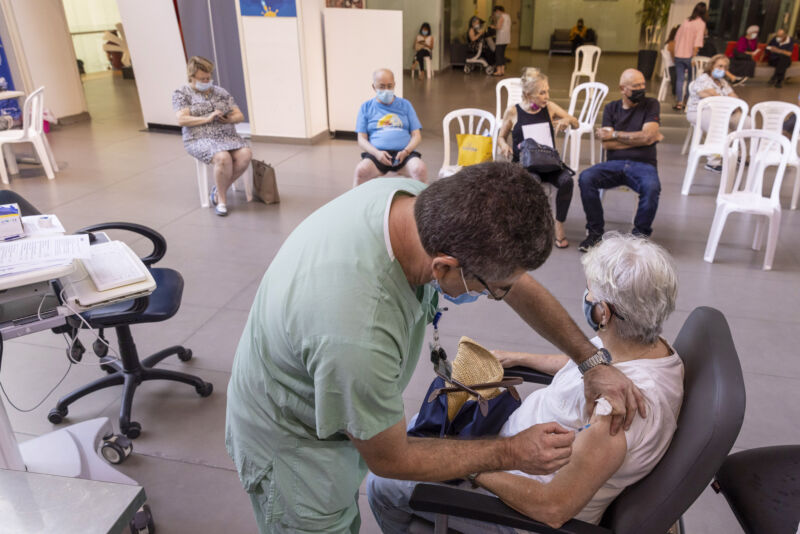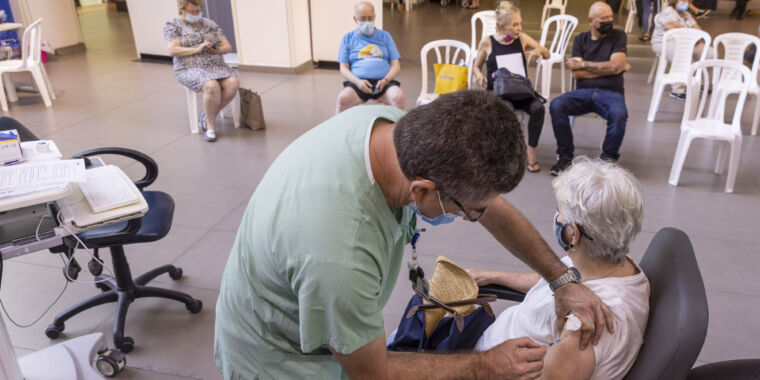
Update 3/29/2022, 4pm ET: Soon after approval from the Food and Drug Administration earlier Tuesday, the Centers for Disease Control and Prevention announced it is updating its recommendations to give people 50 and older and certain immunocompromised people a second booster dose of either the Pfizer/BioNTech or Moderna COVID -19 vaccines.
“Today, CDC expanded the eligibility for an additional booster dose for certain individuals who may be at higher risk for serious consequences from COVID-19,” CDC Director Rochelle Walensky said in a statement. “Boosters are safe and people over 50 can now receive an additional booster 4 months after their previous dose to further increase their protection. This is especially important for those over 65 and those over 50 with underlying medical conditions that increase their risk of developing cancer. serious illness from COVID-19, as they are currently most likely to receive an additional booster dose. CDC, in conjunction with the FDA and our public health partners, will continue to evaluate the need for additional booster doses for all Americans. ”
The agency also announced that adults who received a Johnson & Johnson COVID-19 vaccine and a Johnson & Johnson booster dose more than four months ago are now also eligible for a second booster dose of an mRNA vaccine (Pfizer/BioNTech or Moderna).
The CDC’s decision, like the FDA’s approval, was carried out without convening their respective independent advisory committees to deliberate on expanding the use of boosters. Without input from those committees, the two agencies risk being criticized for rushing the review and using second boosters. In an afternoon press briefing, FDA vaccine regulator Peter Marks explained that bypassing the agency’s advisory committee by saying the decision to allow second boosters was “relatively easy.”
Original story 3/29/2022, 12:44 ET: The US Food and Drug Administration announced Tuesday the approval of second booster doses of both the Pfizer/BioNTech and Moderna COVID-19 vaccines for people 50 and older, as well as for certain immunocompromised people.
The FDA’s decision, made without consulting its panel of independent expert advisors, was expected this week.
“Current evidence suggests that protection is somewhat diminished over time against severe effects of COVID-19 in elderly and immunocompromised individuals,” said Peter Marks, the FDA’s chief vaccine regulator, in a statement. “Based on an analysis of emerging data, a second booster dose of the Pfizer-BioNTech or Moderna COVID-19 vaccine could help increase protection levels for these higher-risk individuals.”
Particularly under the emergency clearance, people 50 and older can receive a second booster of the Pfizer/BioNTech or Moderna vaccine if they are four or more months away from their first booster. For certain immunocompromised people who are four months away from their first booster, a second Pfizer/BioNTech booster is available for ages 12 and older, and a second Moderna booster for ages 18 and older. The categories of immunocompromised people eligible for a second booster include those who have undergone a solid organ transplant and those with similar levels of immunodeficiency.
There is scarce data on the effectiveness and durability of a second booster against omicron, the dominant variant worldwide. Most of the data evaluated comes from Israeli researchers, who have published three studies to date. In one study conducted using medical records of more than 1.1 million people ages 60 and older, those on a second booster (also known as a fourth dose in unimmune-compromised people) were two times less likely to get infected. and about four times less likely to get severe COVID-19 compared to people who had only three shots.
In a much smaller study involving 1,050 younger, healthy health professionals, researchers found that a fourth dose increased antibody levels, but effectiveness against symptomatic infection with omicron was low — 43 percent for Pfizer and 31 percent for Moderna. Although the study is small and the confidence intervals for those estimates are broad, the authors concluded that “a fourth vaccination of healthy young health professionals may have only marginal benefits. Older and vulnerable populations were not assessed.”
In a third study of more than 560,000 people aged 60 and older, a second booster reduced the risk of death from COVID-19 by 78 percent compared to those who received their first booster just four months ago.

